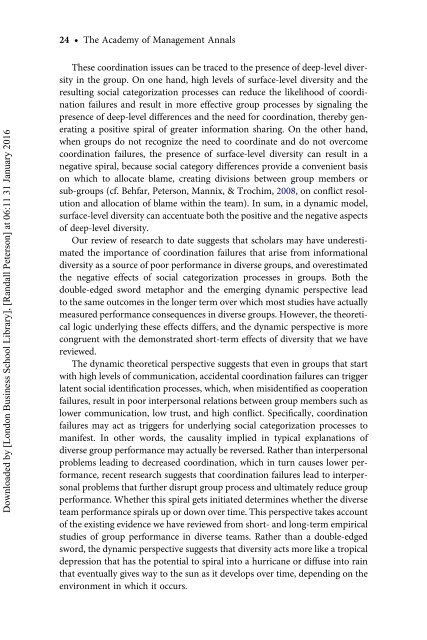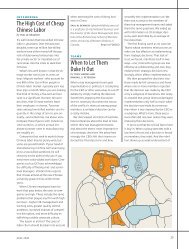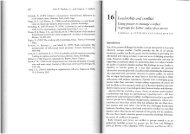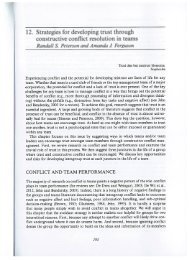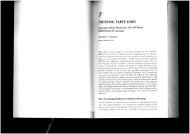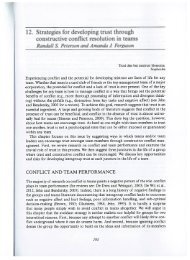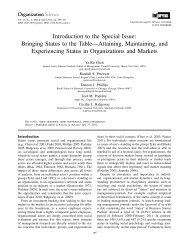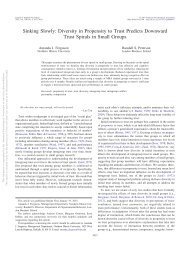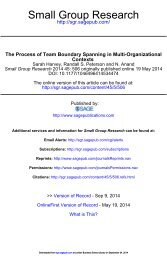A Dynamic Perspective on Diverse Teams: Moving From The Dual Process Model to A Dynamic Coordination-Based Model of Diverse Team Performance - Kannan Srikanth, Sarah Harvey & Randall Peterson
The existing literature on diverse teams suggests that diversity is both helpful to teams in making more information available and encouraging creativity and damaging to teams in reducing cohesion and information sharing. Thus the extant literature suggests that diversity within teams is a double-edged sword that leads to both positive and negative effects simultaneously.
The existing literature on diverse teams suggests that diversity is both helpful to teams in making more information available and encouraging creativity and
damaging to teams in reducing cohesion and information sharing. Thus the
extant literature suggests that diversity within teams is a double-edged sword
that leads to both positive and negative effects simultaneously.
Create successful ePaper yourself
Turn your PDF publications into a flip-book with our unique Google optimized e-Paper software.
24 † <strong>The</strong> Academy <strong>of</strong> Management Annals<br />
Downloaded by [L<strong>on</strong>d<strong>on</strong> Business School Library], [<strong>Randall</strong> Peters<strong>on</strong>] at 06:11 31 January 2016<br />
<strong>The</strong>se coordinati<strong>on</strong> issues can be traced <strong>to</strong> the presence <strong>of</strong> deep-level diversity<br />
in the group. On <strong>on</strong>e hand, high levels <strong>of</strong> surface-level diversity and the<br />
resulting social categorizati<strong>on</strong> processes can reduce the likelihood <strong>of</strong> coordinati<strong>on</strong><br />
failures and result in more effective group processes by signaling the<br />
presence <strong>of</strong> deep-level differences and the need for coordinati<strong>on</strong>, thereby generating<br />
a positive spiral <strong>of</strong> greater informati<strong>on</strong> sharing. On the other hand,<br />
when groups do not recognize the need <strong>to</strong> coordinate and do not overcome<br />
coordinati<strong>on</strong> failures, the presence <strong>of</strong> surface-level diversity can result in a<br />
negative spiral, because social category differences provide a c<strong>on</strong>venient basis<br />
<strong>on</strong> which <strong>to</strong> allocate blame, creating divisi<strong>on</strong>s between group members or<br />
sub-groups (cf. Behfar, Peters<strong>on</strong>, Mannix, & Trochim, 2008, <strong>on</strong> c<strong>on</strong>flict resoluti<strong>on</strong><br />
and allocati<strong>on</strong> <strong>of</strong> blame within the team). In sum, in a dynamic model,<br />
surface-level diversity can accentuate both the positive and the negative aspects<br />
<strong>of</strong> deep-level diversity.<br />
Our review <strong>of</strong> research <strong>to</strong> date suggests that scholars may have underestimated<br />
the importance <strong>of</strong> coordinati<strong>on</strong> failures that arise from informati<strong>on</strong>al<br />
diversity as a source <strong>of</strong> poor performance in diverse groups, and overestimated<br />
the negative effects <strong>of</strong> social categorizati<strong>on</strong> processes in groups. Both the<br />
double-edged sword metaphor and the emerging dynamic perspective lead<br />
<strong>to</strong> the same outcomes in the l<strong>on</strong>ger term over which most studies have actually<br />
measured performance c<strong>on</strong>sequences in diverse groups. However, the theoretical<br />
logic underlying these effects differs, and the dynamic perspective is more<br />
c<strong>on</strong>gruent with the dem<strong>on</strong>strated short-term effects <strong>of</strong> diversity that we have<br />
reviewed.<br />
<strong>The</strong> dynamic theoretical perspective suggests that even in groups that start<br />
with high levels <strong>of</strong> communicati<strong>on</strong>, accidental coordinati<strong>on</strong> failures can trigger<br />
latent social identificati<strong>on</strong> processes, which, when misidentified as cooperati<strong>on</strong><br />
failures, result in poor interpers<strong>on</strong>al relati<strong>on</strong>s between group members such as<br />
lower communicati<strong>on</strong>, low trust, and high c<strong>on</strong>flict. Specifically, coordinati<strong>on</strong><br />
failures may act as triggers for underlying social categorizati<strong>on</strong> processes <strong>to</strong><br />
manifest. In other words, the causality implied in typical explanati<strong>on</strong>s <strong>of</strong><br />
diverse group performance may actually be reversed. Rather than interpers<strong>on</strong>al<br />
problems leading <strong>to</strong> decreased coordinati<strong>on</strong>, which in turn causes lower performance,<br />
recent research suggests that coordinati<strong>on</strong> failures lead <strong>to</strong> interpers<strong>on</strong>al<br />
problems that further disrupt group process and ultimately reduce group<br />
performance. Whether this spiral gets initiated determines whether the diverse<br />
team performance spirals up or down over time. This perspective takes account<br />
<strong>of</strong> the existing evidence we have reviewed from short- and l<strong>on</strong>g-term empirical<br />
studies <strong>of</strong> group performance in diverse teams. Rather than a double-edged<br />
sword, the dynamic perspective suggests that diversity acts more like a tropical<br />
depressi<strong>on</strong> that has the potential <strong>to</strong> spiral in<strong>to</strong> a hurricane or diffuse in<strong>to</strong> rain<br />
that eventually gives way <strong>to</strong> the sun as it develops over time, depending <strong>on</strong> the<br />
envir<strong>on</strong>ment in which it occurs.


